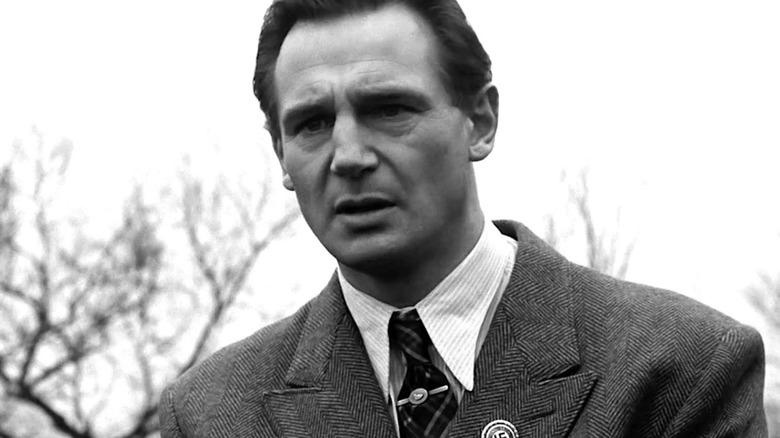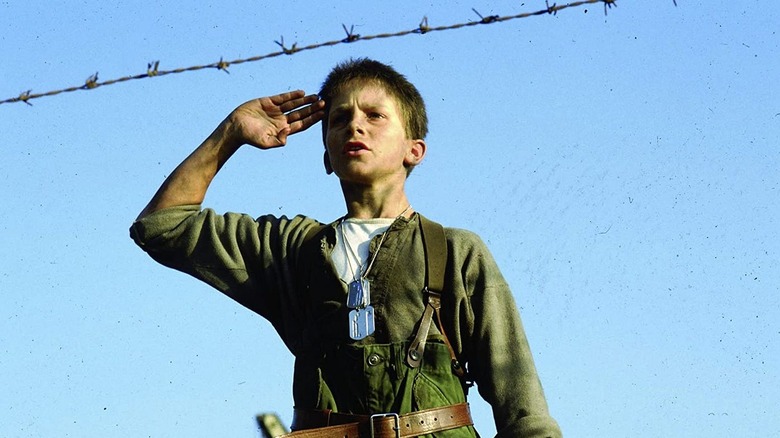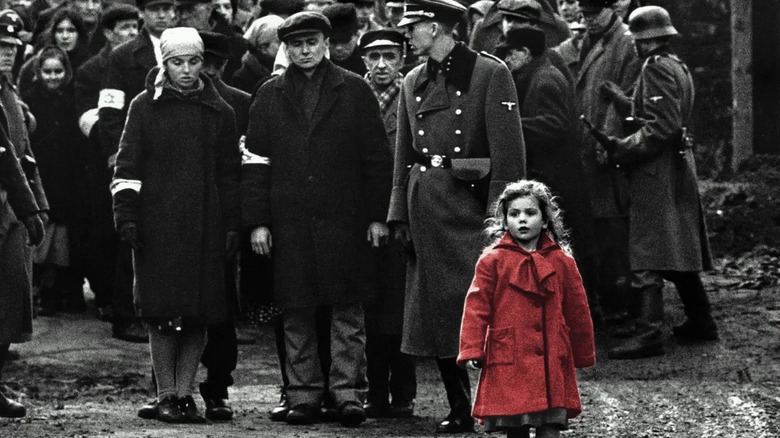The Two Movies That Convinced Director Steven Spielberg He Could Make Schindler's List
It's fair to say that "Schindler's List" changed the course of Steven Spielberg's career. The wunderkind filmmaker invented the blockbuster with "Jaws" and rose to become one of the most successful directors of all time. But there was something Spielberg wanted more than fame and money: respect. He didn't just want to be the blockbuster guy; he wanted to be taken seriously as an artist.
"Schindler's List" was the film that finally did that, signaling Spielberg as a "serious" filmmaker capable of winning multiple Oscars for his hard work. The historical drama earned Spielberg some of the best reviews of his career, and it took home seven Academy Awards — including giving Spielberg his first Best Director Oscar (he'd take home the award again for another World War II drama, "Saving Private Ryan").
Spielberg had to work his way up to making such a serious movie, and "Schindler's List" wasn't the first time the filmmaker chased Oscar gold and artistic respect. In a new oral history of "Schindler's List," Spielberg revealed that he couldn't have made the film were it not for two of his previous works.
The Color Purple and Empire of the Sun
Steven Spielberg always wanted an Oscar. A film crew captured his disappointment when he was not nominated for Best Director for "Jaws," and while he would finally get nominated for the award for "Close Encounters of the Third Kind," he didn't win. He was nominated again for "Raiders of the Lost Ark," and then "E.T. the Extra-Terrestrial," and again, in both instances, he lost. These films had something in common: they were blockbusters. While Spielberg saw "E.T." as a small personal film, it was still ultimately a popcorn flick — loaded with special effects like "Close Encounters" and "Raiders." The filmmaker realized a change was needed — he would have to make something "serious." Something dramatic. Something for adults. Eventually, he would realize his Oscar dreams with "Schindler's List." But getting there would require testing the waters — something he did with two other serious films.
In the new "Schindler's List" oral history, Spielberg admits: "I couldn't have made Schindler's List without 'The Color Purple' and then 'Empire of the Sun.' Those were my two huge steppingstones before I really took a deep breath and said, 'Now I'm ready.'" Released in 1985, "The Color Purple" was arguably Spielberg's first "adult" movie — a sweeping, dramatic adaptation of Alice Walker's novel about the life of a Black woman named Celie. It was Spielberg's first non-blockbuster (although it was a box-office success), and it did indeed earn him a Best Director nomination — although he didn't win.
"Empire of the Sun," released in 1987, follows a young boy living as a prisoner of war in an internment camp during World War II. Again, Spielberg was trying new things as a filmmaker, although he ultimately would not be nominated for Best Director for the work.
The triumph of Schindler's List
None of this is to say Spielberg only made these movies because he wanted an Oscar. Was that part of it? Maybe. But what the filmmaker was really chasing was respect, and proof that he was more than just the "blockbuster guy." He didn't just make popcorn flicks, he made art. But he not only needed to prove that to audiences — he needed to prove it to himself. And that's where "The Color Purple" and "Empire of the Sun" come in. By making these two very adult dramas, Spielberg was proving to himself that he could do more than create spectacle.
And by making those two films, the director finally built up enough confidence in his talents to make his most acclaimed film, "Schindler's List." Far from simply being "awards bait," "Schindler's List" is an absolute triumph of filmmaking. It's Spielberg taking everything he's learned about moviemaking and channeling it into a sprawling, important, staggering work of art. It's arguably the most important movie of Spielberg's entire career, and "The Color Purple" and "Empire of the Sun" helped him get there.


